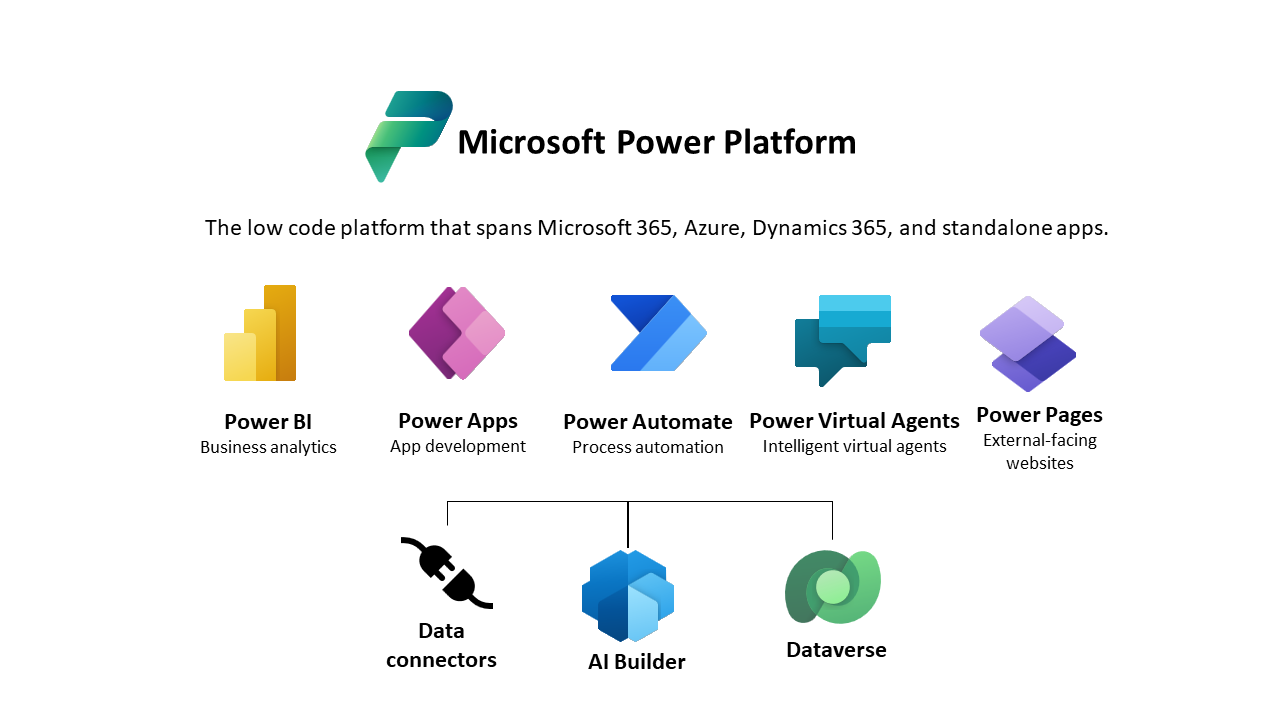Introduction
In the dynamic world of business, data is a pivotal asset that drives decisions, innovations, and strategies. Harnessing the power of data, however, requires sophisticated tools that can not only gather and store information but also analyze and present it in a meaningful way. Enter Microsoft Dataverse, a cutting-edge platform that stands at the core of the Power Platform, transforming how businesses manage and utilize their data. This digital powerhouse unifies business data across various applications, enabling organizations to achieve streamlined operations and enhanced insights.
Through its integration within the Power Platform, Microsoft Dataverse offers a robust foundation for building and deploying custom apps, automating workflows, and generating advanced analytics. This article delves into the pivotal role of Microsoft Dataverse in the Power Platform, illuminating how it centralizes business data to foster better decision-making and operational efficiency.
Understanding Microsoft Dataverse
What is Microsoft Dataverse?
Microsoft Dataverse represents a significant leap forward in how businesses can manage and interact with their data across various applications and services. At its core, Microsoft Dataverse is a cloud-based storage space that allows for the secure and scalable storage of data. It is not just a database; it is a platform for data integration and management that supports a wide array of data types – from standard and custom data types to complex business logics.
It serves as a unified data schema that applications within the Microsoft ecosystem, like Dynamics 365, Power BI, and, importantly, the Power Platform, can use to store and manage data. This unified approach ensures that data is consistent, accessible, and secure across all applications, making it easier for businesses to derive insights and action from their data.
Key features of Microsoft Dataverse
The Dataverse is rich with features that facilitate efficient data management and application development. Some of its key features include:
– Rich Data Types and Relationships: Supports a wide variety of data types and allows for the definition of rich relationships between different entities, enabling complex data structures and hierarchies.
– Security: It incorporates robust security models, including row-level security and role-based access controls, ensuring that data is secure and accessible only to authorized users.
– Logic and Validation: Offers the ability to embed business logic and validation rules directly into the data model, allowing for the automation of workflows and the enforcement of data quality.
– Integration: Provides seamless integration capabilities with other Microsoft products and services, as well as with external systems, through the use of connectors and APIs.
– Scalability: Designed with scalability in mind, it allows businesses to store and manage data from a handful of records to millions, scaling as the business grows.
Microsoft Dataverse in Power Platform
Integration of Microsoft Dataverse with Power Platform
The integration of Microsoft Dataverse with Power Platform is a game-changer for businesses seeking to streamline operations and enhance efficiency. Power Platform, Microsoft’s suite of business application tools, including Power BI, Power Apps, Power Automate, and Power Virtual Agents, directly taps into the data within Dataverse.
This seamless integration allows for the quick creation of apps, insightful analytics, automated workflows, and virtual agents that use the unified data model, significantly reducing the complexity and time required for development. Data collected and processed through any of the Power Platform applications is stored in Dataverse, making it immediately accessible to other applications for further use or analysis.
Benefits of using Microsoft Dataverse in Power Platform
The combination of Microsoft Dataverse and Power Platform offers several benefits, such as:
– Unified Data Model: Centralizes data from various sources, providing a single source of truth that enhances data consistency and accessibility.
– Rapid Development: Accelerates the development of business applications with minimal coding, leveraging the pre-built and extensible data schema of Dataverse.
– Customization and Flexibility: Enables customization of data models, forms, views, and business logic to suit unique business requirements.
– Enhanced Insights and Decision Making: Facilitates better insights and decision-making through real-time data analytics and reporting capabilities.
– Increased Productivity: Automates workflows and processes, reducing manual tasks and streamlining operations.
Real-world examples of businesses leveraging Microsoft Dataverse for unified data
Businesses across industries are leveraging the power of Microsoft Dataverse and the Power Platform to unify their data and drive efficiency. For instance:
– Retail: A retail chain used Power Apps to create custom applications for inventory management, incorporating data from sales, inventory, and customer feedback into Dataverse for streamlined operations and real-time insights.
– Healthcare: A healthcare provider deployed Power BI dashboards that integrate patient data from various sources within Dataverse to deliver personalized patient care and operational insights.
– Manufacturing: A manufacturing company utilized Power Automate in conjunction with Dataverse to automate their supply chain processes, reducing errors and improving efficiency by ensuring timely and accurate data across systems.
These examples illustrate the transformative impact of integrating Microsoft Dataverse with Power Platform, enabling businesses to harness the full potential of their data for improved insights, decision-making, and operational efficiency.
Unifying Business Data with Microsoft Dataverse
Importance of unifying business data
In today’s fast-paced business environment, the ability to quickly access and analyze information is key to staying competitive. Companies often find themselves drowning in data silos, where valuable information is scattered across various systems and platforms, making it difficult to get a comprehensive view of the business landscape. Unifying business data, therefore, becomes crucial as it enables organizations to have a single source of truth. This cohesion not only streamlines operations but also enhances decision-making processes, customer engagement, and ultimately drives growth.
How Microsoft Dataverse facilitates unification of business data
Microsoft Dataverse serves as a robust framework for bringing disparate data sources together into a cohesive, manageable environment. By providing a centralized storage space for data collected from various applications, Dataverse eliminates the complexities of data silos. It supports a wide range of data types, including relational data, non-relational data such as images and files, and even metadata. Importantly, Dataverse integrates seamlessly with the entire Microsoft Power Platform and other Microsoft services, which allows for easy data access and manipulation through familiar tools like Power BI, Power Apps, and Power Automate. This integration empowers organizations to customize and extend their applications to meet their unique business needs, all while ensuring data unification and integrity.
Case studies demonstrating the impact of unified business data on insights
Several organizations have witnessed the transformative impact of leveraging Microsoft Dataverse to unify their business data. For instance, a retail giant integrated their customer interaction data across various channels into Dataverse, enabling a 360-degree view of the customer journey. This holistic understanding led to targeted marketing strategies that boosted customer engagement and sales. Another example involves a manufacturing company that unified its operations data from the production floor to supply chain logistics.
By analyzing this unified data, the company could identify bottlenecks and inefficiencies, paving the way for process optimization and cost savings. These case studies underscore the value of a unified data approach in enhancing business insights and driving outcomes.
Leveraging Better Insights for Streamlined Operations

How unified business data leads to better insights
The consolidation of business data into a single, accessible repository like Microsoft Dataverse inherently leads to enhanced analytics and insights. With data fragmentation out of the way, analytics tools can delve deeper into the data, uncover patterns, and provide actionable insights that were previously obscured by data siloes. This comprehensive view facilitates better understanding of customer behaviors, operational efficiencies, and market trends, among other aspects. Consequently, businesses are not just reacting to the data, but proactively using it to shape strategies and innovations.
Using insights from Microsoft Dataverse for improved decision-making
Armed with comprehensive insights sourced from unified data in Dataverse, decision-makers can approach their strategies with greater confidence. For example, insights into consumer behavior can guide marketing teams in crafting more effective campaigns. Similarly, visibility into operational data can help management identify areas for improvement, optimize resource allocation, and reduce waste. This informed approach to decision-making ultimately results in more efficient operations, higher customer satisfaction, and improved financial performance.
Implementing data-driven strategies for streamlined operations
Ultimately, the journey towards streamlined operations hinges on the ability to implement data-driven strategies effectively. With a unified data platform like Microsoft Dataverse underpinning these strategies, businesses can more readily adopt a data-centric approach across all facets of their operations. Whether it’s automating routine tasks to increase efficiency, refining product offerings based on customer feedback, or reshaping supply chain strategies to mitigate risks, the insights derived from Dataverse empower organizations to make smarter, more informed decisions. This alignment not only enhances operational efficiency but also fosters a culture of continuous improvement and innovation.
Conclusion
In the realm of digital transformation, the role of data is paramount. Microsoft Dataverse, as part of Microsoft’s Power Platform, stands as a pivotal solution for businesses aiming to harness their data for comprehensive insights and more efficient operations. Through offering a unified data schema, it simplifies the complex landscape of business data, making it accessible and actionable for users across various levels of an organization. With the MS power platform consulting and integration capabilities of Dataverse, businesses can leverage a seamless connection between apps and workflows, enhancing productivity and fostering a data-driven culture.
Moreover, by utilizing Power Platform consulting services, organizations can tailor the capabilities of Microsoft Dataverse to their specific needs, ensuring that they are maximizing the value of their investment in the platform. The alignment of data and processes facilitated by Dataverse not only drives informed decision-making but also paves the way for innovative solutions that can adapt to the evolving business environment.
In essence, Microsoft Dataverse, as an integral component of the Power Platform, is transforming the way businesses approach data management. By unifying disparate data sources and providing a robust platform for analysis and action, Dataverse is enabling businesses to achieve clearer insights and streamlined operations—key ingredients in the recipe for digital success.
External Resources:
- Microsoft Power Platform Consulting
- Power Platform Integration: Bridging the Gap Between IT and Business Users
- Use cases of Microsoft Power Platform
- Utilize Microsoft’s suite of no-code/low-code tools
- Microsoft Power Platform Consulting services – Power BI and Power Automate
- Microsoft Power Platform for Finance Industry
- Power Platform Integration & development support
- Microsoft Power Platform consulting for manufacturing industries


